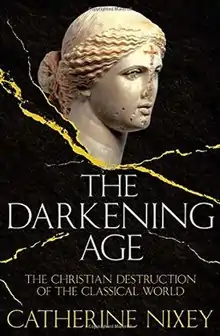The Darkening Age
The Darkening Age: The Christian Destruction of the Classical World is a 2017 book by Catherine Nixey. In the book, Nixey argues that early Christians deliberately destroyed classical Greek and Roman cultures and caused the Dark Ages.[1][2] Despite popular success, the book received extensive criticism from professional scholars of late antiquity and the Middle Ages, who accused it of telling a simplistic, polemical narrative and exaggerating the extent to which early Christians suppressed aspects of older Greek and Roman cultures.[3]
 First edition (UK) | |
| Author | Catherine Nixey |
|---|---|
| Genre | History |
| Publisher | Macmillan Publishers (UK) Houghton Mifflin Harcourt (US) |
Publication date | September 21, 2017 |
| Pages | 352 |
| ISBN | 978-0544800885 |
Content
After expressing the opinion that traditional historical narratives tend to depict pre-Christian Rome in an unfavorable light (chilly and nihilistic), Nixey proceeds to describe what she sees as an attack by Christians against classical heritage during Late Antiquity, which is a period generally encompassing the Later Roman Empire and the Early Middle Ages. The assault she alleges is both physical and cultural, taking the reader from the murder of Hypatia in 415 and the destruction of pagan statues, to the closing of temples and destruction of books.[2]
For Nixey, these episodes of violent religious zeal are explained by a widely promoted belief that pagan religions actually harbored demons, and also by the powerful rhetoric Christian leaders used against the enemies of the early church. In that sense, she thinks the foundations of later religious persecution were laid at that time.[2]
Reception
Among the general public
The Darkening Age was chosen as one of The New York Times' "Notable Books" for 2018 and was listed on "book of the year" lists by The Telegraph, The Spectator, The Observer, and BBC History.[4]
Among scholars
Professor Edith Hall, a professor of Classics at King's College London, described the work as "Engaging and erudite... offer[ing[ both a compelling argument and a wonderful eye for vivid detail" and "a triumph" in an interview with Nixey to promote the book.[5]
Peter Thonemann, a professor of ancient history at the University of Oxford, argues that Nixey's work is problematic, and that "the argument depends on quite a bit of nifty footwork", because Nixey makes a large number of broad generalizations based on limited evidence. He also states that the deliberate destruction of ancient temples by Christians "seems to have been exceptionally rare in real life" and that the Christian book-burning was always directed towards heretical or "magical" writing, and not towards classical literature.[6]
Professor Tim Whitmarsh of Cambridge University described it as "a finely crafted, invigorating polemic against the resilient popular myth that presents the Christianisation of Rome as the triumph of a kinder, gentler politics. On those terms, it succeeds brilliantly". He also cautions that the work risks being one-sided. He said it represented a reversion to Edward Gibbon's view of the Christians as instigators of the fall of Rome. "In seeking to expose the error and corruption of the early Christian world, Nixey comes close to veiling the pre-Christian Romans’ own barbarous qualities," he said.[2]
Johannes (Hans) van Oort, a Dutch Professor of Patristics and Gnostic Studies at Radboud University, states that Nixey "is replaying her hand with her fierce tone and gross exaggeration" and that her book "lacks any historical structure". Van Oort also writes that Nixey doesn't understand some historical contexts and that she "makes some serious historical slips".[7]
Levi Roach, a medievalist of University of Exeter, states that Nixey's book "does not seek to present a balanced picture" and that it is "a book of generalisations". He also states, "Nixey ends up endorsing the long-debunked view of the Middle Ages as a period of blind faith and intellectual stagnation".[8]
Richard Tada, PhD in ancient Greek and Byzantine history from the University of Washington, states that Nixey ventured "into areas where she is clearly out of her depth". Consequently, her book is "a shoddy work that fails to make the grade even as a polemic". One of Nixey's attempts to blame Christians for the supposedly destruction of classical world is "simply dishonest", where she misrepresents both primary and secondary sources.[9]
Averil Cameron, professor emerita of Late Antique and Byzantine History at the University of Oxford, points out that Nixey is promoting some outdated teachings and finds Nixey's book without nuance and counter-arguments, and states that Nixey's readers would never know that there are academic works that contradict her narrative if they only get their information from her.[3] On Twitter Cameron called Nixey's book "a travesty".[10]
Accolades
The book won second prize in the 2015 Royal Society of Literature Jerwood Awards for Non-Fiction.
References
- Hughes, Bettany (June 18, 2018). "How Christians Destroyed the Ancient World". New York Times. Retrieved November 24, 2018.
- Whitmarsh, Tim (December 28, 2017). "The Darkening Age: The Christian Destruction of the Classical World by Catherine Nixey". The Guardian. Retrieved May 30, 2019.
- Cameron, Averil (September 21, 2017). "Blame the Christians". The Tablet.
- "The Darkening Age: The Christian Destruction of the Classical World". HMH Books. Retrieved February 29, 2020.
- "History Extra podcast - Christianity and the classical world on Stitcher". Stitcher. Retrieved August 26, 2021.
- Thonemann, Peter (September 17, 2017). "Book review: The Darkening Age: The Christian Destruction of the Classical World by Catherine Nixey". The Sunday Times.
- van Oort, J. (February 5, 2018). "Britse historicus Nixey vertekent de opkomst van het christendom fanatiek". Reformatorisch Dagblad. Retrieved January 13, 2020.
- Roach, Levi (November 2017). "At Cross Purposes". Literary Review.
- Tada, Richard (August 11, 2018). "The Myth That Christians Destroyed the Classical World Dies Hard". National review.
- https://twitter.com/19Averil/status/927509564823654401. Twitter published 6. nov. 2017. Dame Averill Cameron. Date: December 16, 2019.